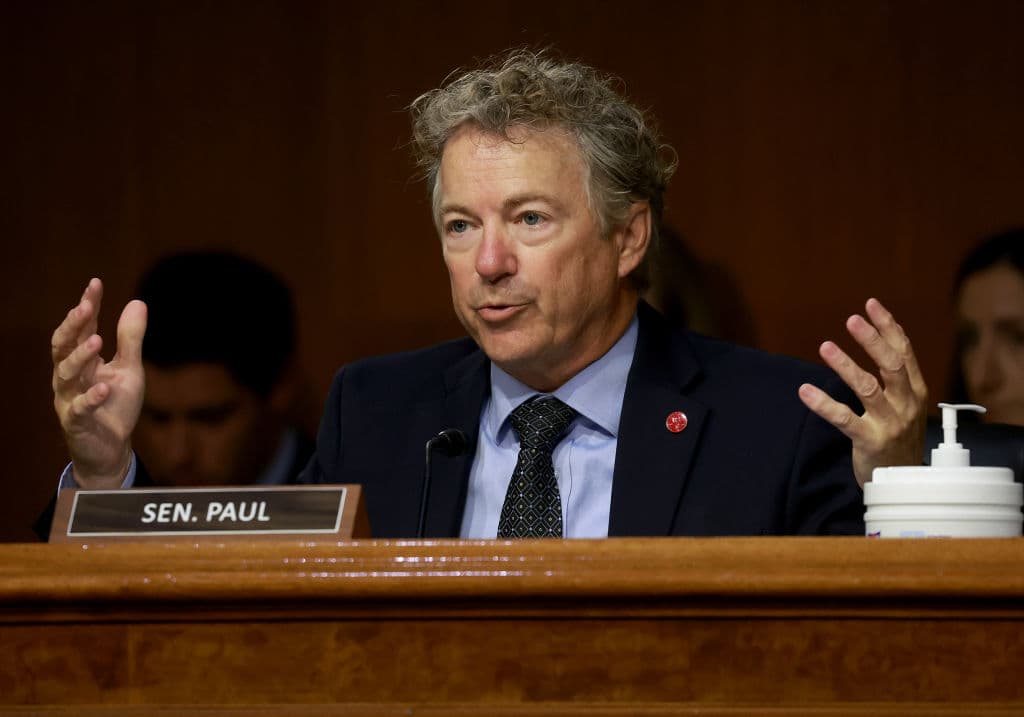On Impeachment, Will GOP Heed Rand Paul and ‘Be Better Than the Democrats’?
Senator warns against making impeachment a common practice — or a retaliation for the Democrats’ ‘rushed’ impeachments of President Trump.

Senator Paul, Republican of Kentucky, warning against impeachment becoming a common practice, is urging his House colleagues to gather evidence before launching formal proceedings against President Biden — lest the process becomes retaliation for the “rushed” trials of President Trump.
The top Republican in the House, Speaker McCarthy, told reporters on Tuesday that “to get to the bottom of the truth,” the “only” option is an impeachment inquiry which “gives us the apex of the power of Congress for Republicans and Democrats to gather the information that they need.”
Democrats, however, are not itching to rummage through Mr. Biden’s alleged illegal business dealings. To bring any of their caucus onboard, much less get the 67 votes needed for conviction in a Senate they control, the GOP needs hard evidence. So far, they have only soft allegations.
Earlier this month, two Internal Revenue Service whistleblowers testified to the House about the “Biden family’s influence peddling schemes” and alleged “politicization and misconduct” by FBI and DOJ officials during investigations into Mr. Biden.
In July, the Sun described the allegations of “high-level graft” reportedly made the American-Israeli professor and former Israeli lieutenant colonel, Gal Luft. Fox News reported on Friday that “the Biden family, possibly Joe Biden himself, has offshore bank accounts.” They aren’t illegal, just embarrassing.
Such allegations against Mr. Biden may rise to the level of “high crimes and misdemeanors,” which is the language in the Constitution for grounds of impeachment. But as the French saying goes: Avec des ‘si,’ on mettrait Paris en bouteille — “With ‘ifs,’ one could put Paris in a bottle.”
The logic of a formal impeachment process is that it allows the Congress to compel evidence that it ordinarily might lack for grounds to seek. The absence of the invocation of impeachment authority was one of the problems that undercut the work of the House January 6 committee.
Impeachment inquiries help harvest votes while prompting donors to break out their checkbooks and “sign on the line that is dotted,” as a salesman puts it in David Mamet’s “Glengarry Glen Ross,” but impeachment is in danger of becoming just another version of the speaker’s gavel, handed back and forth with party control.
Successful impeachments of lower officeholders have been built on evidence, not “ifs.” Noting the reported existence of recordings damaging to Mr. Biden, Dr. Paul told Fox News what ought to be obvious: “We should listen to those and make a judgment,” he said, “but I think it would be better to gather more evidence before an impeachment if there’s going to be impeachment.”
Dr. Paul doesn’t see impeachment as a hammer and every allegation as a nail. “I think we should be better than the Democrats,” he said. “The Democrats immediately rushed to impeachment without hearings, this and that. I think there needs to be continued investigation.”
Mr. McCarthy, leading a narrow majority, straddled the line. “The actions that I’m seeing by this administration,” he said, “withholding the agencies from being able to work with us, that would rise to the level of an impeachment inquiry,” before backing off by mentioning that Republicans “still have a number of investigations going forward.”
The fact that those investigations are already underway undermines the argument that an impeachment inquiry is the only tool at hand. It also highlights why — until recent times — the impeachment power was a hammer Congress left to gather dust in its tool shed.
In 1868, President Andrew Johnson’s impeachment fell short. It was the nation’s first, coming 79 years after President Washington assumed office. More than a century passed before President Nixon resigned in 1974 when conviction in the Senate seemed certain. In the event, the House never passed articles of impeachment against Nixon. Twenty-four years later, President Clinton was impeached but was discovered by the Senate to be not guilty.
Two decades later, Mr. Trump was impeached twice in 13 months, but he, too, was discovered by the Senate to be not guilty. Mr. Trump, like Mr. Clinton, cast himself as a victim of a partisan witch hunt. The argument carries weight when Congress launched just two impeachment inquiries against the first 37 presidents but has done so three times against the last four.
The principal defense lawyer in the 1989 impeachment trial of Judge Walter L. Nixon, Jr., David O. Stewart, told me that Dr. Paul is on the right track. “Removing a president from office and reversing the outcome of our national election is ultimately a political judgment that this president is not worthy of the office, not simply that you don’t like him or her.”
Mr. Stewart, author of “Impeached: The Trial of President Andrew Johnson and the Fight for Lincoln’s Legacy,” said, “Most politicians will not render that judgment unless they believe the people agree. No such consensus has formed about our current president.”
“Let’s have quite a bit of evidence out there that the American people are actually behind this,” Dr. Paul said of impeachment, “because I don’t really want to impeach every president who comes forward,” and the country will suffer if that constitutional hammer becomes just another tool for beating up the opposition.

